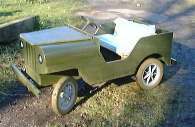WORTLEY TOP
FORGE MODEL ENGINEERS
Jeremy the Jeep -
By Gary Sutton
One
day last autumn Bryan Donn approached me and offered to test my woodworking
skills.
“I have a part built Jeep that I started some years ago and it
needs finishing off. Are you interested ?”
I accepted the kind offer
and the following week the ‘kit’ arrived in the back of Bryan’s
van.
Plans were supplied together with the MDF cut-outs which constituted
the bodywork for the new baby.
On returning home, perusal of the plans left
me with a number of challenges in order to complete the project. Where can I
get wheels from ? What sort of motor and drive to use ?
In true Model
Engineering tradition I set about collecting a kit of materials to enable the
steering, drive, windscreen etc. to be constructed. Criteria were : cheap or
free, readily available, could be modified from something which already
exists.
In due course, the building of the bodywork began and the build
rate accelerated over the Christmas ’98 holidays. This consisted of
‘screwing and gluing’ the MDF sections to softwood rails which
reinforced the structure sufficient, eventually, to support the weight of one
small boy, and / or one big one !
As the structure grew I began to realise
why Bryan had decided not to complete it as the weight increased with each
panel fitted. Having done sufficient to see how it would look I turned my time
to acquiring the outstanding materials and re-assessing the design of some of
the components.
Firstly the front axle was completed having
re-designed the ‘king pin’ area as I was not convinced of the
benefits of the original ‘nuts rotating around threaded bar’
solution.
After much deliberation, and ideas from many quarters, I tracked
down a set of 4 wheels, for free, at a company which repairs wheelchairs. Great
now I can build the stub axles and finish the front end off.
It was at this
point that I realised how poor my welding skills had become and some of the
work had to be re-done as the included welds were removed using bruit force and
ignorance, as my Dad always says. However, the front axle and wheel assembly
was completed and attached to the part rolling chassis, much to Mark’s
delight. “Is it nearly finished then Dad ? When can I ride in it ?”.
“Hopefully before you leave home for University, son !”
Now the drive mechanism ; chain drive was specified
but I considered that the start up load, on the motor from standstill, was
excessive considering the weight of the vehicle. I also had concerns about
running the motor as a dynamo whilst rolling but not driving so I devised a
cunning plan to start the motor in free running mode and then via a belt and
‘jockey wheel’ tensioner gradually take up the drive. The jockey
wheel had to be spring loaded whilst being loosely attached to the accelerator
pedal.
A motor and gearbox from our old friend at Parkside was purchased
and the fun began on how to harness the power from the output shaft to the
single rear driven wheel. The wheels were of the 7 spoke variety, moulded from
plastic and therefore having plenty of draft angle on them to enable withdrawal
from the mould tool. This was certainly a challenge considering the basic
workshop equipment I own.
In the end I milled 7 mating slots in a piece of
3” aluminium bar which was then bored out and the painstaking task of
matching the draft angles was completed by filing.
The back axle came next
and the Deep Cycle Battery was bought. It was now late March and the time had
come for the first trial run. The drive seemed to work quite well but the motor
seemed under powered and laboured, an issue which was later to come back and
haunt me !
However, it stimulated mine, and Mark’s, enthusiasm that we
could one day soon see ‘Jeremy’ running around the Forge.
The
inner and outer wings were skinned with aluminium and, for the first time, the
traditional Jeep shape became apparent.
Much painting was followed by the
wiring up and installation of switches to control : on / off, forward /
reverse.
Jeremy was alive at last ! but the gravel drive and solid tyre
combination limited Mark’s forays mostly to cruising around the Forge on
Sunday afternoons. The school summer fayre saw Mark driving passengers around a
couple of circuits of the playground, a task which was adequately performed
almost non - stop for three and a half hours.

The Penistone Mayors Parade saw Mark and Daniel
proudly sitting in Jeremy on the front of Les’s low loader as it wound its
way around the streets.
Some weeks later disaster struck ! Over enthusiastic
driving and carrying too many passengers resulted in the motor drastically
overheating. Jeremy was left to cool down. Suddenly a plume of smoke appeared
from under his bonnet and I rushed across to attempt to remove a battery strap
only to be beaten by the cable, having melted the insulation, shorting and
finally breaking the circuit.
Lesson learnt ; make sure that the circuits
are properly fused ! Fuses are cheaper than motors !
Given time Jeremy will
rise from the ashes this time harnessing a Sinclair C5 motor and hopefully with
a folding windscreen to complete it.
It has been an interesting project which I hope will have
encouraged Mark and others of the merits of making something yourself and
understanding the principles of engineering, even if it is not right the first
time.
Gary Sutton
Back to projects

